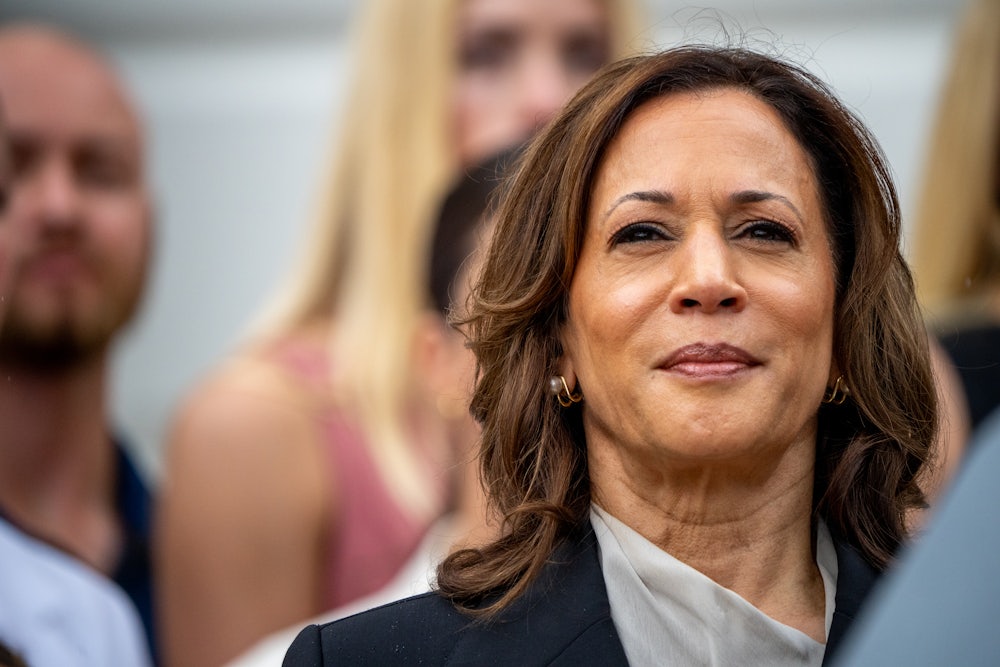After seven weeks of euphoria over Kamala Harris’s ascension to the top of the Democratic presidential ticket, panic finally returned to the party on Sunday. The New York Times published a poll showing Donald Trump with a slim lead over Harris nationally and a dead heat in the seven swing states that will decide the November election. With Tuesday’s debate fast approaching, the momentum that had sustained Harris since President Biden withdrew from the race has clearly dissipated.
This was always going to be a very close election, even after Harris replaced Biden. But the tightening of the polls over the past week points to a failure in Harris’s campaign. She had nearly two months to show voters who she is and what she stands for. Instead, she has played it safe, hoping to maintain the positive vibes and momentum of the summer by deliberately not staking out positions on controversial policies. It’s now clear that that approach is no longer working. As the Times’ Nate Cohn wrote on Sunday, “More than anything, voters say they want to hear more about where she stands on the issues, something her campaign has seemed to struggle to lay out.”
This is actually the good news in an otherwise dismal poll. With two months to go until the election, Harris has plenty of time—and one pivotal debate—to define herself for the voters. But that will require abandoning the cautious approach she’s taking up since becoming the nominee—and publicly breaking with Joe Biden.
Three days before the Times poll came out, amid growing consternation about her deliberate lack of a clear and detailed agenda, Kamala Harris’s campaign announced a new policy—sort of. Harris, her campaign said, was no longer in favor of banning plastic straws. Five years ago, as a senator from California, she came out in favor of phasing out plastic straws and replacing them with paper ones—albeit with better ones than the flimsy kind that degrade after you’ve drunk a third of your McDonald’s Diet Coke. Now Harris is fine with the status quo.
This is a comical example of a very real trend after Harris became the presumptive nominee in late July: She quickly jettisoned progressive positions she took during the 2020 presidential race—such as gun buybacks, a fracking ban, and Medicare for All—without saying much about where she currently stands. Last month’s DNC was a celebration of the party’s normalcy and the middle class, but there was little of substance beneath it. Her big policy ideas in August were to punish price gouging in grocery stores, kill taxes on tips, and spur the construction of new homes.
The campaign’s strategy, it seemed, was to ride those good summer vibes and avoid the risk of an aggressive policy agenda that would expose her to criticism. But having too few policies is also risky, not least because it makes Harris look like she doesn’t stand for anything (and also because her few policy stances then get nitpicked to death: Her price-gouging solution was roundly criticized by economists across the political spectrum, while her tip policy has come under fire because it was first taken up by Trump).
The Harris campaign is only now, belatedly, realizing that this is a problem. On Sunday, they finally added an “Issues” section to her website. It includes a slew of policies that the campaign has previously outlined, as well as sections on reproductive and civil rights. Unfortunately for Harris, its release was undermined by a simple but telling error: The page’s source code revealed that parts of the platform were copied directly from Biden’s campaign page.
This is dangerous territory for Harris, given that the Times poll found that more than 60 percent of voters wanted the next president to represent a “major change” from Biden—and only a quarter felt that Harris represented that change. That makes sense, given that she’s his vice president! But it means she should be working overtime to distinguish herself from her boss. Instead, she’s doing precisely the opposite. Unwilling to break publicly with Biden—to criticize his handling of say, inflation, immigration, or Israel—she has simply positioned herself as a younger version of him. Whether that’s intentional on her part or the result of her campaign being run largely by the same people who ran Biden’s disastrous reelection bid is unclear.
Regardless, Tuesday’s debate is the perfect moment for Harris to step out of Biden’s shadow. Trump is going to attempt to paint her as a younger, female version of the president—someone who owns all of the things that voters don’t like, rightly or wrongly, about his administration. Harris can prove Trump wrong by revealing where she differs from Biden. A ruthless and effective debater in the past, she’ll also no doubt tear apart Trump’s own dismal policy record. But these strategies not only require her to show her command over policy—which shouldn’t be too hard, when contrasted with Trump’s general incoherence—but also to stake out territory that isn’t defined in its opposition to Trump’s or Biden’s policies. In other words, she needs a positive agenda.
The polls are clear: The summer honeymoon is over. This debate will likely be Harris’s best opportunity to shift the polls back in her favor—and to define herself to the millions of voters who are on the fence about her. But it will also require her to take uncomfortable, even controversial positions. She can no longer expect to keep reaping political rewards without taking any risks.






